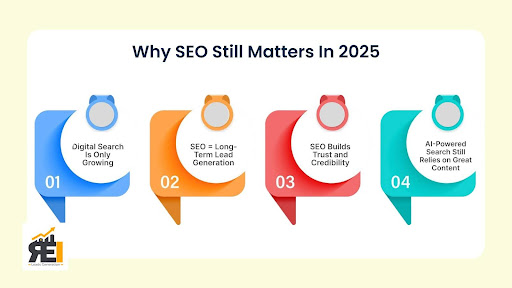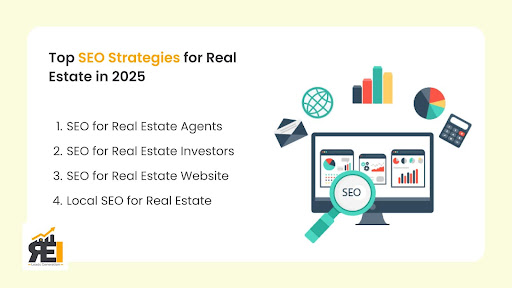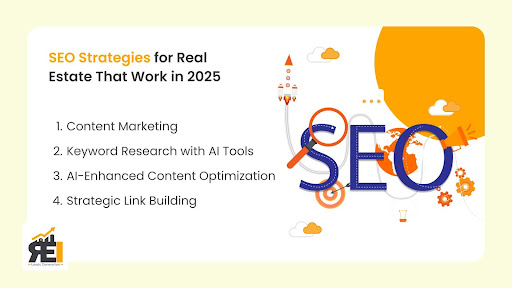SEO for Real Estate in 2025
In the fast-evolving world of real estate marketing, one question keeps popping up: Is SEO still worth it for real estate leads in 2025?
The answer is a strong yes—but with a catch. SEO in 2025 isn’t about stuffing keywords or gaming Google’s algorithm. It’s about creating real value, being visible in local markets, and building long-term trust.
Let’s break down how SEO for real estate has evolved, and why it’s still one of the most powerful tools for generating quality leads—especially for agents, investors, and wholesalers.
Why SEO Still Matters in 2025

1. Digital Search Is Only Growing
Homebuyers and sellers aren’t flipping through newspapers—they’re on Google. Whether it’s a homeowner looking to sell fast for cash or a buyer searching “homes for sale in Dallas,” they start with a search engine.
SEO for real estate ensures you show up when it matters most.
2. SEO = Long-Term Lead Generation
Unlike Google Ads or Facebook boosts, SEO delivers organic traffic—without paying for every click.
With consistent content and smart optimization, your site becomes a lead magnet that works 24/7 without draining your ad budget.
3. SEO Builds Trust and Credibility
People trust Google. When your website appears on Page 1, it sends a strong signal that you’re a credible real estate expert. Combine that with high-quality content, reviews, and local signals, and you build serious authority.
4. AI-Powered Search Still Relies on Great Content
Even with the rise of AI-enhanced search and voice assistants, strong SEO practices remain essential.
Search engines still need structured, optimized content to summarize, rank, and recommend.
Top SEO Strategies for Real Estate in 2025

SEO for Real Estate Agents
If you’re a licensed agent, SEO helps attract qualified local clients without relying on cold calls or buying leads.
Focus on:
- Geo-specific keywords: “realtor in [your city]”
- Google Business Profile optimization
- Blog posts answering buyer/seller questions
- Testimonials and trust signals
Example: Instead of targeting “best realtor,” go for “top-rated real estate agent in Plano, TX.”
SEO for Real Estate Investors
For investors, SEO is a goldmine for attracting motivated sellers, distressed property owners, or landlords wanting to offload fast.
Optimize for keywords like:
- “sell my house fast [city]”
- “we buy houses [city]”
- “stop foreclosure [state]”
Pair this with educational blog content like:
- “How to Sell a House Without a Realtor in 2025”
- “Avoiding Foreclosure in [Your State] – What Sellers Need to Know”
SEO for Real Estate Website
Your real estate website is your digital storefront. It must be:
- Fast-loading (under 3 seconds)
- Mobile-optimized
- Secured (HTTPS)
- Easy to navigate
Add schema markup (like property listings), clean internal linking, and compelling visuals to stand out.
Don’t forget: a well-optimized website = more traffic, better user experience, and higher conversion rates.
Local SEO for Real Estate
Local SEO is the secret weapon in 2025. Most real estate searches have local intent:
“Best cash home buyers in San Antonio”
“Buy my house without repairs in Tampa”
Key actions:
- Optimize your Google Business Profile
- Get local backlinks (real estate blogs, news sites, directories)
- Use NAP consistency (Name, Address, Phone) across all listings
- Encourage Google reviews
SEO Strategies for Real Estate That Work in 2025

1. Content Marketing
Create high-quality blogs, videos, and guides that answer the exact questions your audience is Googling.
Examples:
- “Should I Sell My House As-Is in 2025?”
- “How to Find Motivated Sellers Without Cold Calling”
- “Is It Better to List or Sell to an Investor?”
2. Keyword Research with AI Tools
Use tools like Ahrefs, Surfer, or ChatGPT to identify:
- Long-tail keywords: “sell inherited house fast in Phoenix”
- Semantic keywords: Related phrases people are also searching
- Low-competition topics for faster rankings
3. AI-Enhanced Content Optimization
Focus on:
- Topic depth
- Schema markup
- Featured snippet targeting
- Answering People Also Ask questions
This helps your content get picked for AI search summaries like Google’s SGE and Bing Copilot.
4. Strategic Link Building
Not all backlinks are equal. Go for:
- Local media
- Real estate associations
- Podcasts and interviews
- Guest posts on niche blogs
Just one backlink from a high-authority local site can boost your trust score massively.
Conclusion:
In 2025, SEO for real estate is not just still relevant—it’s essential. While tactics have evolved, the goal remains the same: to connect with motivated buyers and sellers online. By focusing on local SEO, high-quality content, mobile optimization, and strategic keywords, real estate agents and investors can build long-term visibility, trust, and consistent lead flow. If you want to scale your real estate business without relying entirely on paid ads, mastering SEO is one of the smartest investments you can make.
At REI Marketing Experts, we help real estate investors and agents master SEO for real estate by creating high-ranking content, optimizing websites, and building local visibility that drives consistent motivated seller and buyer leads.
FAQs
Q1: Does SEO work for real estate?
Absolutely. SEO helps real estate professionals rank on search engines, generate targeted leads, and build long-term visibility without ongoing ad spend.
Q2: How do I use SEO for real estate investing?
Focus on targeting seller-intent keywords like “sell house fast,” create helpful content, optimize your website, and build local SEO authority to attract motivated sellers.
Q3: What is the best SEO strategy for real estate?
A combination of local SEO, keyword research, optimized content, fast-loading mobile-friendly websites, and strong backlinks is the most effective strategy.
Q4: Is local SEO important for real estate?
Yes. Real estate is hyper-local, and local SEO helps you get found by people in your specific area looking to buy, sell, or invest in property.
Q5: Can AI help with real estate SEO?
Definitely. AI can assist with keyword research, content generation, competitor analysis, and on-page optimization—making your SEO strategy faster and smarter.

